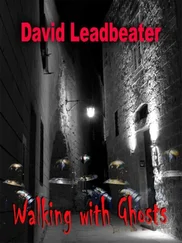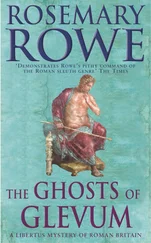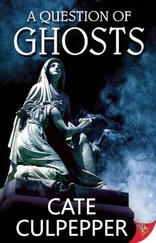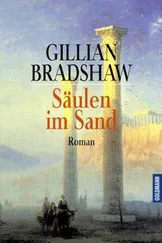Gillian Bradshaw - Island of Ghosts
Здесь есть возможность читать онлайн «Gillian Bradshaw - Island of Ghosts» весь текст электронной книги совершенно бесплатно (целиком полную версию без сокращений). В некоторых случаях можно слушать аудио, скачать через торрент в формате fb2 и присутствует краткое содержание. Жанр: Исторические приключения, на английском языке. Описание произведения, (предисловие) а так же отзывы посетителей доступны на портале библиотеки ЛибКат.
- Название:Island of Ghosts
- Автор:
- Жанр:
- Год:неизвестен
- ISBN:нет данных
- Рейтинг книги:3 / 5. Голосов: 1
-
Избранное:Добавить в избранное
- Отзывы:
-
Ваша оценка:
- 60
- 1
- 2
- 3
- 4
- 5
Island of Ghosts: краткое содержание, описание и аннотация
Предлагаем к чтению аннотацию, описание, краткое содержание или предисловие (зависит от того, что написал сам автор книги «Island of Ghosts»). Если вы не нашли необходимую информацию о книге — напишите в комментариях, мы постараемся отыскать её.
Island of Ghosts — читать онлайн бесплатно полную книгу (весь текст) целиком
Ниже представлен текст книги, разбитый по страницам. Система сохранения места последней прочитанной страницы, позволяет с удобством читать онлайн бесплатно книгу «Island of Ghosts», без необходимости каждый раз заново искать на чём Вы остановились. Поставьте закладку, и сможете в любой момент перейти на страницу, на которой закончили чтение.
Интервал:
Закладка:
I waited in the shipyard for my men, then waited, with them, for the wagons, then saw the wagons arranged and the men and horses settled. My bodyguard-the thirty men and two officers of my personal squadron-offered to come with me to see Facilis and the procurator, and also offered, though fearfully, to join me if I was allowed on a ship: I refused both offers. They had a great sense of the respect due me as their prince-commander, and Facilis would only offend it and them-and there was no point in dragging their proud loyalty in terror across the ocean when at best it was an unnecessary voyage. It was dark when I set off for the center of the camp.
The camp headquarters were shut and locked; the guards told me that the procurator was next door, in his house, and that Facilis was with him. I went to the house and asked to speak with them. The servants told me to wait, and when I’d tethered my horse, they ushered me into the courtyard so as to keep my smell of horses and camp dirt out of the house. The courtyard was colonnaded and paved with flagstones; a few bushes of rosemary straggled from terracotta pots. There was lamplight in the glass windows and a smell of cooking. I sat down in the shelter of the colonnade and waited, resting my head on my knees and rubbing my stiff leg.
“If it were up to me, sir,” came Facilis’ voice from behind me, “I’d have killed them all before they ever left Aquincum.”
That made me raise my head. A shuttered window on the courtyard had been pushed open, and the procurator was standing in a cloud of lamplight, looking out at the night. Facilis must have stood behind him. I remained where I was, in the shadow of the colonnade, and listened.
“But the emperor wants them alive,” Facilis went on, “so it’s my job to make sure they get to Britain that way. Sir, he appointed me himself. I’m Pannonian by birth, and I know the Sarmatians. He knew he could trust me to make sure of them.”
“You haven’t said anything to me that indicates there’s the slightest reason for concern,” the procurator replied irritably. “I know that the emperor put you in charge of them, Marcus Flavius, but he put me in charge of the British fleet. I can use my own judgment about how to get these barbarians across the Channel, and it seems to me that if I go clapping chains on their leaders, the men will be sure to mutiny.” (In the back of my mind I made a note that, although Facilis called him dominus, “sir,” he addressed Facilis by his first two names, informally: he spoke with the confidence of noble birth and high rank, and the centurion was forced to honor that.)
“You don’t know anything about them!” Facilis said. “You seem to think they’re like the Gauls or the Germans, nice safe conquered barbarians, who’ll more or less do as they’re told if you treat them kindly! Sarmatians are different. They’ve taken it into their heads that we’ve tricked them and mean to murder them, and they’ll try to hit us hard while we’re not looking. I’d stake my sword on it they’ve managed to hide some weapons in those wagons, for all our precautions, and they’re sitting about their fires now plotting how to kill us.”
He was perfectly correct on that.
“Really!” exclaimed the procurator in disgust, turning away from the window. “I seem to recall hearing that our invincible emperor did conquer them, by the favor of the immortal gods.”
“His ‘Thundering Victory,’ ” Facilis answered, in a tone of equal disgust. “Yes. I was there. But maybe you haven’t heard the details of what came before that victory. They’d been raiding us for years-they thought it was a brave and manly thing to slip across the Danube with a troop of cavalry and steal the flocks and property of Romans, killing anyone who got in their way. They weren’t afraid of us in the least. The cities cried out to the emperor as the raids got worse and worse, and the emperor decided to settle the Sarmatians for good. For a year we fought. We caught a raiding party on the Danube in the winter, and fought a battle actually on the ice of the river-but that only meant that the next raiding parties were bigger. We negotiated and got nowhere, and at last we set off to conquer the Sarmatians, with all the Danube legions, detachments from all the western legions and some of the eastern ones, more auxiliaries than I could count, and the emperor himself as commander. Twice the number of their army, at least; three, four times their number. We marched out into the plains-and found no one. You can’t besiege their cities, because they don’t have any; you can’t burn their crops to force them to give battle, because they don’t have any of those, either. They keep herds and live in wagons.
“We had reports, though, that their king was in the northeast of the country, and his army with him, so we marched on. And when we’d gone a long way, they attacked our supply train and chopped our rear guard to pieces, cutting us off. We sent out foraging parties, looking for food and water, and sometimes the foraging parties came back, and sometimes they didn’t. I’ve been out myself, and come across a dip in the hills and found a party of thirty lads lying there, shot full of arrows, with everything stripped off them but their tunics, and their skulls looking like peeled grapes-and all the hills around empty, just grass and dust. Didn’t you see the scalps hanging from their horses’ bridles when they came in? Arshak has thirty-seven, ten on the bridle and the rest stitched onto his coat, all from Roman soldiers he’s killed with his own hands-and he’d love to add mine to his collection. Jupiter! he would!”
“Those tassels on the bridles?” said the procurator. “Those are scalps? I thought…”
“Those are scalps. It’s a custom of theirs. But that was just playing with us. One night when we were making camp, their army turned up. Good! we thought. Our turn at last! I tell you, sir, the heavy cavalry rode right over us. Twice. They used the lance on the way there, and the long swords on the way back, and all the while the light cavalry rained arrows on us. Twenty men I lost from my century that day, and the rest ran into our camp as soon as it was built, and hid. Next day we tried to retreat-and we couldn’t. We managed to reach a patch of hills, the one damned patch of hills in that whole dry plain, and there we sat like a weasel up a tree, perishing of thirst, and didn’t dare come down. And we would have died there, all of us, if the gods hadn’t favored the emperor and sent the most torrential thunderstorm. The horses slipped in the mud, and we rushed out and caught them. By Mars, it was sweet, to catch them on the ground for once! They had enough fighting pretty quickly then, and galloped off, and a party of our auxiliary cavalry went after them and found one of their base camps, where they had some of their herds and some of the women and children: we drove off the herds and killed the bitches and their brats, and that was our Thundering Victory!
“It hurt them, all right, hurt them enough that they started begging us for peace. But they’re not conquered yet. You can’t conquer a people who don’t build cities: it’s like trying to carry water in your hands. The emperor thought of exterminating the whole horde of them. But it would have taken time to catch them all, and by then he had no time, and a rebellion in the East screaming for his attention. So when they offered to give us eight thousand troops if we went away, the emperor accepted, with the provision that all the troops had to be heavy cavalry. He wanted the troops-we’d all seen how good they were-and he knew that if we had them, they wouldn’t. Only the important men, what they call azatani, can afford armor: the commoners fight as mounted archers. To get eight thousand heavy cavalry, they had to send us practically every nobleman between the ages of sixteen and thirty-the very men who’d started the whole war with their raids across the Danube, and who’d poured out rivers of our blood. They won’t start any wars now until the next generation grows up. But there’s no province of Sarmatia yet, and while there’s a Sarmatian alive, there never will be. There’ll be more wars, in ten, fifteen years’ time, and this lot know that just as well as I do.”
Читать дальшеИнтервал:
Закладка:
Похожие книги на «Island of Ghosts»
Представляем Вашему вниманию похожие книги на «Island of Ghosts» списком для выбора. Мы отобрали схожую по названию и смыслу литературу в надежде предоставить читателям больше вариантов отыскать новые, интересные, ещё непрочитанные произведения.
Обсуждение, отзывы о книге «Island of Ghosts» и просто собственные мнения читателей. Оставьте ваши комментарии, напишите, что Вы думаете о произведении, его смысле или главных героях. Укажите что конкретно понравилось, а что нет, и почему Вы так считаете.












